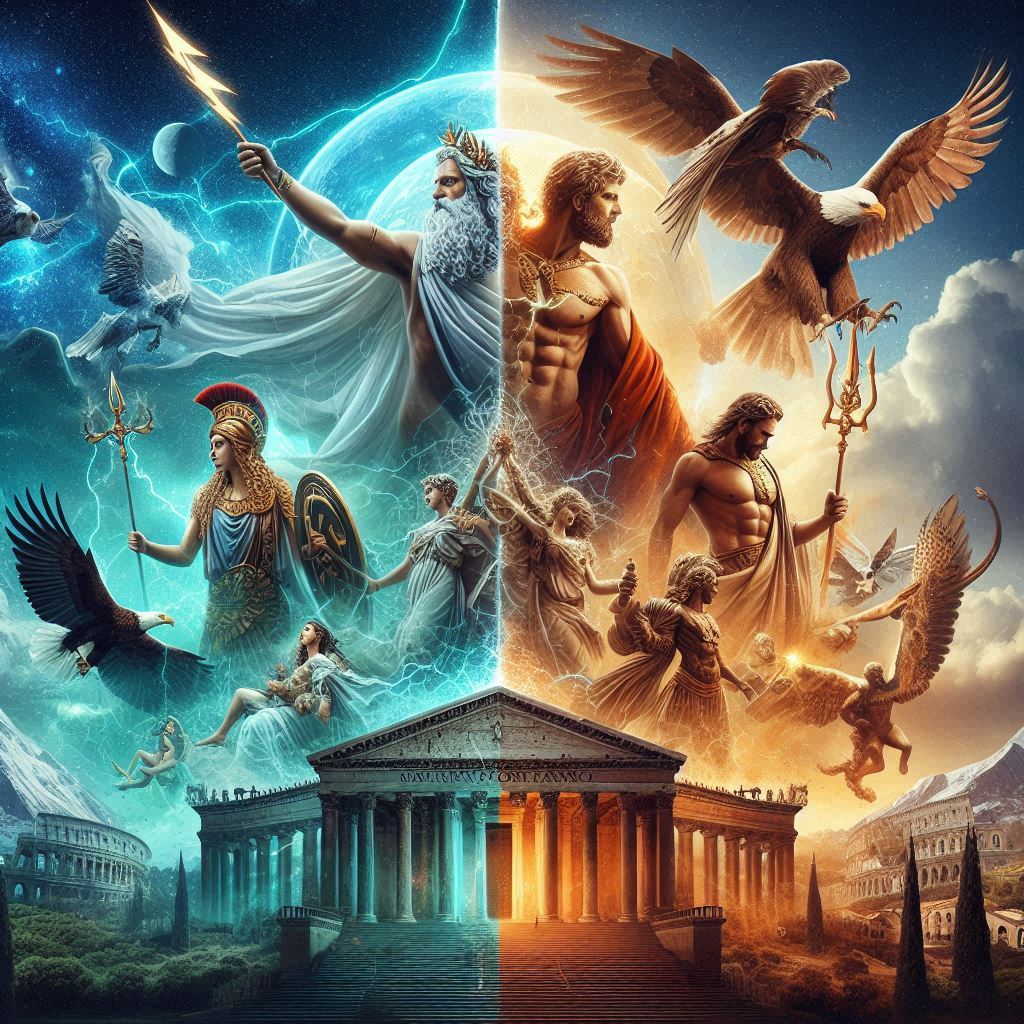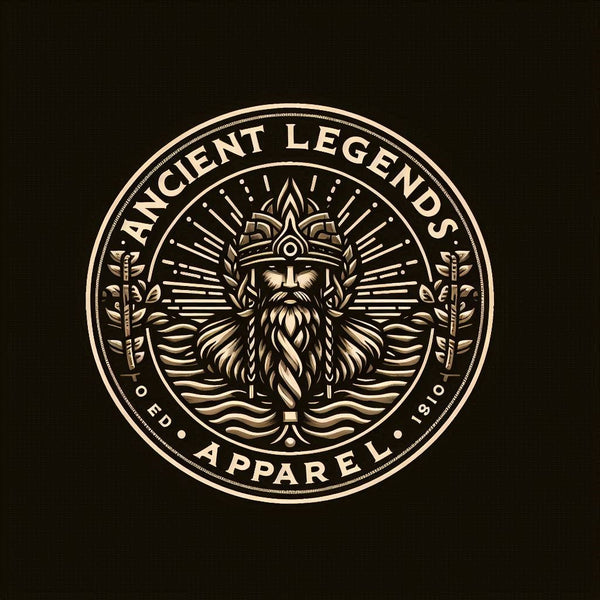
Roman Mythology vs. Greek Mythology: Key Differences and Similarities
Karl FinnbogasonShare
Roman and Greek mythology are two of the most influential and well-known mythological traditions in history. The Romans borrowed heavily from Greek mythology, adopting many of the same gods and myths but adapting them to fit their own culture, values, and political system.
While the two mythologies share many similarities, there are also significant differences in names, characteristics, religious practices, and historical impact.
This article explores the key similarities and differences between Greek and Roman mythology, shedding light on how these two rich traditions shaped Western civilization.
1. Origins and Cultural Context
Both Greek and Roman mythologies emerged from ancient polytheistic beliefs, where gods ruled over different aspects of life. However, their historical contexts influenced how they developed and were used by their respective societies.
Greek Mythology
- Originated around 1200 BCE, flourishing in the Archaic (800–500 BCE) and Classical (500–300 BCE) periods.
- Focused on storytelling, philosophy, and artistic expression.
- Greek myths often explored human emotions, morality, and fate.
- Greek gods were deeply human-like, with flaws, passions, and personal vendettas.
Roman Mythology
- Developed later, around 700 BCE, with its peak influence during the Roman Republic (509–27 BCE) and Empire (27 BCE–476 CE).
- More practical and political, with myths used to justify Rome’s power and divine authority.
- Roman gods were often more disciplined, duty-bound, and war-focused than their Greek counterparts.
- Emphasized rituals, state-sponsored religious ceremonies, and divine favor in warfare.
2. Names of the Gods: Roman vs. Greek
One of the most well-known differences is the names of the gods. While the Romans adopted Greek deities, they changed their names and, in some cases, their roles.
| Greek Name | Roman Name | Domain |
|---|---|---|
| Zeus | Jupiter | King of the gods, Sky, Thunder |
| Hera | Juno | Marriage, Women, Family |
| Poseidon | Neptune | Sea, Earthquakes, Horses |
| Hades | Pluto | Underworld, Wealth |
| Athena | Minerva | Wisdom, War Strategy, Crafts |
| Ares | Mars | War, Bloodshed, Military Power |
| Aphrodite | Venus | Love, Beauty, Fertility |
| Hermes | Mercury | Communication, Travel, Commerce |
| Apollo | Apollo | Sun, Music, Healing, Prophecy |
| Artemis | Diana | Hunting, Moon, Nature |
| Hephaestus | Vulcan | Fire, Blacksmithing, Forge |
| Demeter | Ceres | Agriculture, Harvest, Fertility |
- Similarities: Many gods retained their primary domains and attributes.
- Differences: Roman gods were often more disciplined and less emotional than their Greek counterparts.
3. Personality and Representation of Gods
Greek gods were often depicted as flawed, emotional, and human-like, whereas Roman gods were more disciplined, serious, and duty-focused.
Greek Gods: Emotional and Personified
- Greek deities had distinct personalities and acted with human emotions like jealousy, love, rage, and revenge.
- They often interfered in human affairs, forming personal relationships with mortals.
Example: Zeus had many romantic affairs, leading to conflicts among the gods and humans.
Roman Gods: Symbolic and Political
- Roman gods were seen as symbols of power and order, with less emphasis on personal stories.
- They were more closely associated with military success, law, and governance.
Example: Mars (Roman Ares) was more respected and seen as a protector of Rome, rather than just a chaotic god of war.
4. Mythological Stories and Heroes
While many myths were shared, the way they were interpreted differed between the Greeks and Romans.
Greek Myths: Tragedy and Morality
Greek mythology often revolved around moral lessons, fate, and tragedy.
- The Iliad and Odyssey – Homer’s epic tales focused on human struggles, the wrath of gods, and the hero’s journey.
- Prometheus’ Punishment – The Titan who gave fire to humanity, suffering eternal punishment for defying Zeus.
- Oedipus’ Fate – The tragic story of Oedipus, who unknowingly fulfilled a prophecy that led to his downfall.
Roman Myths: Foundational and Political
Roman myths often served as propaganda to promote Rome’s greatness.
- The Aeneid (by Virgil) – A patriotic epic about Aeneas, the Trojan hero who founded Rome, portraying Roman values of duty and honor.
- Romulus and Remus – The legendary twins raised by a she-wolf, who fought for control of Rome, with Romulus emerging as its founder.
- Julius Caesar’s Divine Lineage – Romans traced their origins to Venus through Aeneas, justifying the divine right of rulers.
5. Afterlife and Religious Beliefs
The afterlife was an important concept in both mythologies, but their views on the underworld and the soul were different.
Greek Afterlife: Hades’ Domain
- The Underworld was ruled by Hades, with separate regions for the virtuous (Elysium), common souls (Asphodel Meadows), and the wicked (Tartarus).
- Focused on reward and punishment based on one’s actions in life.
- Fate played a major role, as destiny could not be avoided.
Roman Afterlife: More Structured and Practical
- Romans adopted Greek beliefs but placed more emphasis on ancestral worship and duty.
- The underworld was still ruled by Pluto, but Roman religious practices focused more on public rituals and honoring past generations.
- Military leaders and emperors were often deified after death, becoming part of Rome’s divine pantheon.
6. Legacy and Influence on Modern Culture
Both Greek and Roman mythology shaped Western civilization, influencing art, literature, philosophy, and government.
Greek Mythology’s Influence
- Literature: Homer’s Iliad and Odyssey are foundational texts of Western literature.
- Philosophy: Myths inspired Plato and Aristotle’s writings on morality and ethics.
- Psychology: The Oedipus Complex (Freud) is based on Greek myths.
Roman Mythology’s Influence
- Government & Law: Roman gods were closely tied to political institutions, inspiring terms like “Senate” and “Republic”.
- Astronomy: Many planets are named after Roman gods (Jupiter, Mars, Venus, Neptune, etc.).
- Architecture: Temples and neoclassical buildings often mimic Roman structures dedicated to the gods.
Two Traditions, One Lasting Impact
While Greek and Roman mythologies share many gods, myths, and themes, they reflect different cultural values.
Greek mythology emphasized personal drama, morality, and fate, while Roman mythology focused on duty, empire-building, and divine political legitimacy.
Even today, their stories continue to inspire movies, books, philosophy, and art, proving that the myths of the ancient world are timeless and universal.
